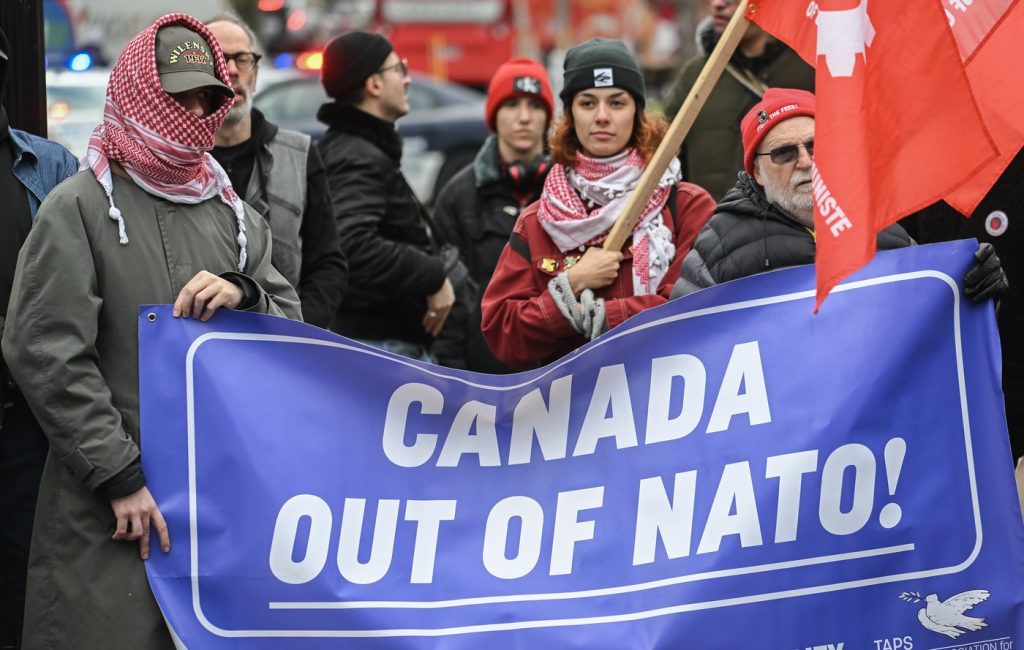Anti-NATO protest in Montreal continues as politicians denounce Friday’s violence

MONTREAL — Anti-NATO protesters gathered again in Montreal on Saturday to demand Canada withdraw from the alliance, a day after a demonstration organized by different groups resulted in arrests, burned cars and shattered windows.
Politicians in the prime minister’s cabinet, opposition parties as well as Quebec leaders have called the violence during Friday’s anti-NATO demonstration acts of antisemitism, but protesters deny the claim, saying they demonstrated against the “complicity” of NATO member countries in a war that has killed thousands of Palestinians.
Police spokesperson Véronique Dubuc said three people were arrested following a demonstration that began late afternoon Friday. She said police arrested a 22-year-old woman for obstructing police work and assaulting a police officer, as well as two men, 22 and 28, both for obstructing police work. All three were released and will appear in court at a later date.
Advertisement
Police said that during the march, smoke bombs were deployed, metal barriers were thrown into the street and windows of businesses and at the convention centre where NATO delegates have been meeting were smashed.
Friday’s protest was organized by the groups Divest for Palestine and the Convergence of Anti-Capitalist Struggles.
Benoît Allard, a member of Divest for Palestine, said he and several other protesters were injured by police and at least four protesters had to go to hospital.
He said the purpose of the protest was to demonstrate against what he called NATO’s “complicity with Israel’s military while it’s conducting its genocide in Gaza, … war crimes in Lebanon, Syria” and that “it’s enforcing illegal occupation of Palestinian territories.”
On Saturday afternoon Prime Minister Justin Trudeau called Friday’s scenes “appalling.”
Advertisement
“Acts of antisemitism, intimidation, and violence must be condemned wherever we see them,” he said on X. “There must be consequences, and rioters held accountable.”
Conservative Leader Pierre Poilievre on X accused the prime minister of being “too busy to condemn a violent Hamas takeover of our streets.” He then followed up with a lengthy statement saying Trudeau has transformed Canada into “a playground for foreign interference.”
Speaking to reporters at the Halifax International Security Forum on Saturday morning, Foreign Affairs Minister Mélanie Joly and Defence Minister Bill Blair said the actions of the protesters were unacceptable.
“What we saw was not peaceful protest. What we saw was actually violence, hate and antisemitism, and this has no place on our streets,” Joly said.
“Those behaviours are unacceptable and we can condemn them, and in particular the hatred and antisemitism that was on display, in the strongest possible terms,” said Blair.
Advertisement
Quebec Premier François Legault also described the scenes as antisemitic.
“Burning cars and smashing windows is not about sending a message, it’s about causing chaos. Such acts have no place in a peaceful society like Quebec,” he wrote.
However, Allard rejected accusations of antisemitism. He said the protests were against the actions of the state of Israel and not Jewish people, adding that earlier this week the International Criminal Court issued an arrest warrant for Israeli Prime Minister Benjamin Netanyahu.
On Thursday, the court said in a news release that there were reasonable grounds to believe Netanyahu committed “the war crime of starvation as a method of warfare; and the crimes against humanity of murder, persecution, and other inhumane acts.”
About 80 people attended Saturday’s anti-NATO protest in downtown Montreal organized by Le Mouvement Québécois pour la Paix, holding signs that read “Canada out of NATO” and chanting “solidarity with Palestine.” Several in attendance held Communist Party of Canada flags while others held Palestinian flags.
Advertisement
Jad Kabbanji, president of Le Mouvement Québécois pour la Paix, said Canada should refuse to meet NATO military spending targets. He also said that despite calling itself a defensive alliance, NATO has destabilized multiple regions across the globe and created military conflicts, notably in the Middle East and eastern Europe.
Kabbanji said Israel’s military campaign in Gaza would not be possible without the arms provided by NATO members like the United States, and that a policy of increasingly accepting countries that were formerly part of the Soviet Union “pushed Russia to invade Ukraine.”
Greg Beaune, the groups vice-president, said the group condemns Russia’s invasion of Ukraine but added NATO has helped provoke conflict in the region.
Group member Rana El Gharbie said she does not support violent protest but added that Canadians are becoming increasingly frustrated by Canada’s support for Israel and “lack of action” in protecting Palestinians.
Delegates from NATO member states and partner countries are in Montreal this weekend to discuss issues including support for Ukraine, climate change and the future of the alliance.
Advertisement
— With files from Sammy Hudes in Toronto.
This report by The Canadian Press was first published Nov. 23, 2024.
Joe Bongiorno, The Canadian Press